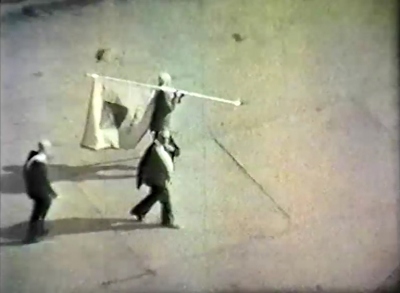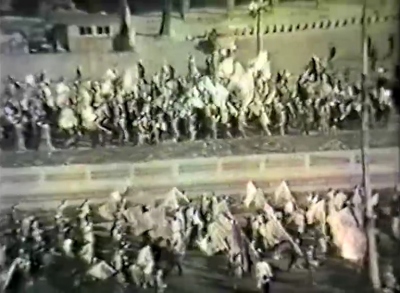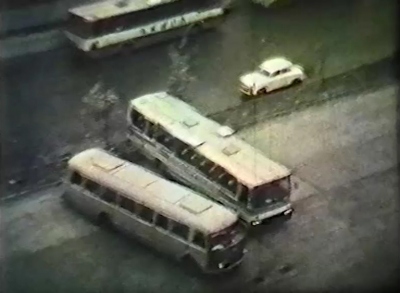Józef Robakowski
From my Window 1978—1999
Taking the idea of cinema as a field of energy transmissions as the starting point for recording his emotional and physical states, in the 1980s to the concept of self-observation or own cinema, consisting in recording his immediate surroundings. The best example of this type of work is the film From my Window 1978–1999, filmed from the artist’s kitchen window, overlooking a concrete square and neighbouring streets in a housing estate in Łódź nicknamed Manhattan. A test version of this film covering the years 1978–1984 and 25 prints from the film are in the Ujazdowski Castle Centre for Contemporary Art’s collection.
For over twenty years, the Robakowski recorded the seemingly trivial events taking place in front of the building. However, accompanied by the author’s often funny, sometimes dramatic off-screen commentary, they become a personal chronicle of events in socialist reality. The film covers important political changes, from the Gierek era to the 1980s crisis. The Citizen’s Militia checking cars and disciplining people appear on the screen. On May 1, a march passes down the street. The main focus of the film, however, are the people – Robakowski’s neighbours, unaware of being filmed, busy going about their lives. Thanks to his commentary, we learn about their real (or partially fictional) fates, interests, and aspirations and about the realities of that period: illegal trade, job losses or people travelling to the city in the hope of buying necessary items. Thanks to this project, Robakowski preserved the atmosphere of times that for some will be a memory, and for others a story about the distant past.
Józef Robakowski is a multimedia artist, photographer, experimental filmmaker, painter, the author of installations, actions and conceptual projects, as well as a curator and educator. He studied art history at the Nicolaus Copernicus University in Toruń and at the Cinematography Department of the PWSFTviT in Łódź, where he is currently a professor.
Robakowski began his artistic career with experiments in photography, among others, as part of the Zero-61 artistic group that brought together many outstanding artists. Later, he was also involved in film as part of the Workshop of the Film Form group, of which he was a co-founder. The members of the WFF opposed traditional, narrative cinematography and focused on analyses of the film medium. The experiments from that period resulted in films presenting a different vision of reality created on the intersection of film and contemporary art.


